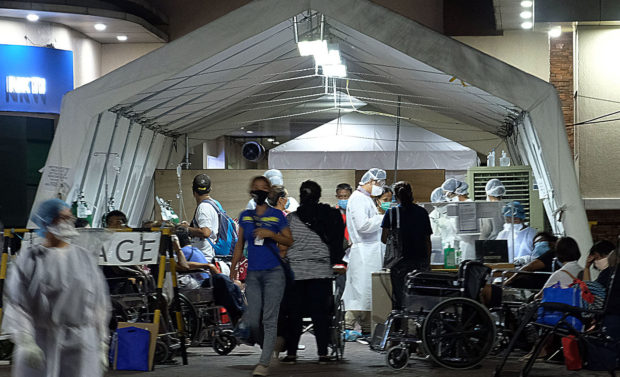DOH: Only 7 of 32 P1-M checks pending

HIGH RISK JOBS | Health workers from the National Kidney and Transplant Institute in Quezon City tend to patients in the triage tent at the hospital. But they risk being exposed to the coronavirus by doing so. (Photo by GRIG C. MONTEGRANDE / Philippine Daily Inquirer)
MANILA, Philippines — Senate Minority Leader Franklin Drilon said on Sunday that families of health workers who died due to the new coronavirus (COVID-19) would no longer be able to receive the P1 million in cash benefits from the government after the law that granted President Duterte special fiscal power expired last Friday.
But Health Secretary Francisco Duque III, when sought for clarification, said: “The Executive branch led by the Department of Justice interprets the Bayanihan Law’s expiry on June 25 as clearly indicated in the law itself.”
Realigning funds
The Department of Health (DOH), in its update on Sunday, said only seven of 32 checks for families of deceased front-liners are due to be issued, the rest having been released
Drilon said Mr. Duterte may still provide compensation by realigning funds from other sources, such as the President’s multibillion-peso intelligence and contingency budget.
“The distribution of the compensation will no longer [be mandated] since it was contained in the law. It’s not in the national budget [for 2020],” Drilon said in a radio interview.
Article continues after this advertisement“But it’s not unlawful for the President, as long as there’s money available, to use his contingency fund. The President has sufficient authority … under the Constitution to realign the budget,” he said.
Article continues after this advertisementMedical abstract
The DOH said 25 of the 32 checks have been received by the concerned families.
“Five have final pending documents such as SPA (special power of attorney) before they can receive the checks,” the DOH said, adding that the two remaining checks are for heirs outside of the country.
The DOH also clarified that it is validating only 42 cases of front-liners who survived the COVID-19 infection and are due for compensation.
“Ten checks out of 42 cases have been prepared. We are validating the 42 cases following submission of medical abstract. Some patients have admitted that their cases were moderate/mild, and not as initially reported as severe,” the DOH said.
The agency added, “There are some instances where patients are included in the severe list but their medical abstracts do not reflect this upon verification [which they also admit], hence they are ‘delisted’ and the list of claimants become shorter.”
“It is indicated in the abstract whether the patient was really severe or not,” the DOH said.
—With reports from Marlon Ramos and Tina G. Santos